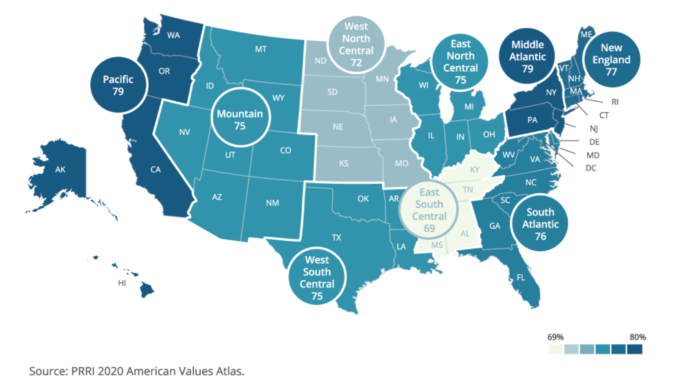A recent report from the Public Religion Research Institute revealed that 76 percent of Americans favor laws that would protect LGBT people from discrimination in employment, housing, and public services. That’s not a typo. Three out of four Americans support the Equality Act. While not wholly unsurprising — support for LGBT rights has risen steadily over time — that’s an incredibly large number considering how much pushback the Equality Act has received from Republicans in Congress. It’s even more baffling considering this statistic: 62 percent of Republicans support some form of nondiscrimination protection for LGBT people.
Yes, that 62 percent number might seem inconceivable. With almost every Republican in Congress voting or likely voting against the Equality Act, with myriad instances shown in the media involving bigotry and discrimination against LGBT people, and with trans women in sports being the new Republican election ploy, how is it possible that 6 out of 10 Republicans support LGBT nondiscrimination?
Simple: in this case, the minority is much more vocal than the majority. And it is that minority, who do not support LGBT nondiscrimination, that Congressional Republicans try to please the most. It seems like a losing battle when you vote against something that more than half of your voter base supports, but pandering to the conservative right has continually gotten Republicans elected. They probably won’t stop now.
Political party aside, the other data from the PRRI report is extremely encouraging and not surprising.
Analyzed by age, the report found that the youngest adults are most in favor of nondiscrimination and the oldest adults are least in favor. But even the oldest adults (65+) are still in favor of nondiscrimination by a 65 percent majority. And in the 18 to 29 age group, 83 percent, yes, over 8 in 10, are supportive of LGBT nondiscrimination laws.
When looked at by race and ethnicity, 81 percent of multiracial Americans, 79 percent of Asian and Pacific Islander Americans, 77 percent of Hispanic Americans, 76 percent of White Americans, 75 percent of Black Americans, and 64 percent of Native Americans support nondiscrimination. All of these groups had age gaps, where younger people of all races and nationalities were more supportive than older people. Women were also more likely to be supportive than men.
Also unsurprising is the geography of those who support LGBT nondiscrimination laws. The most supportive regions were the northeast (78 percent) and the pacific coast (79 percent), and the least supportive region was the south central area of Kentucky, Tennessee, Mississippi and Alabama (69 percent).
Perhaps the one surprising demographic of the report is religion. The most supportive religious group is Jewish Americans (79 percent) with the least supportive being white evangelical protestants (62 percent). However, despite the low number of white evangelical protestant support, a greater number protestants of color (72 percent) now support LGBT nondiscrimination than in 2019. The report also found that fewer Americans support religious exemption policies that allow businesses to discriminate against LGBT people.
While the overall numbers might seem unbelievable, keep in mind that tools like social media allow for a very small number of people to have a very large sphere of influence. People who have anti-LGBT views will always try to persuade people that they are the majority. Even without reports like PRRI’s, it is clear that they are not the majority, and they never will be again.
So, while Senate Republicans continue to balk on the Equality Act, we can take comfort that it’s only a matter of time before the will of the majority becomes too great for them to ignore. Hopefully that time comes sooner rather than later.

